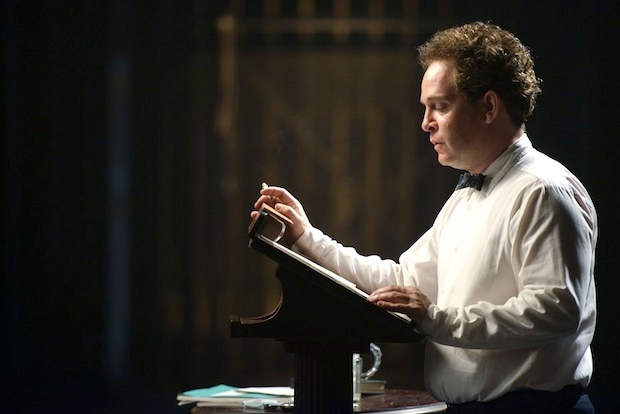According to its executive producer Griff Rhys Jones, A Poet in New York (BBC2, Sunday) sought to rescue Dylan Thomas from the ‘forces of sanctity and hagiography that now hover over his shade’. Instead, we’d be reminded that he was ‘a hollering bohemian roustabout’ — which is presumably Griff’s longhand for ‘a drunk’.
By that measure, the programme was a triumphant success, even if fewer people may have been startled by the revelation of Thomas’s booziness than Griff seems to think. As a piece of television, though, it suffered badly from the decision to concentrate on Thomas’s alcohol-laden final days in New York, which inevitably led to a lack of dramatic variety. This proved a problem that not even a writer as skilful as Andrew Davies and an actor as good as Tom Hollander were able to solve.
We first saw Thomas (Hollander) being greeted at the airport by his two handlers: John Malcolm Brinnin (Ewen Bremner), a classically bow-tied American man of letters, and his assistant Liz Reitell (Phoebe Fox), whose duties turned out to include having sex with Thomas at night and reminding him that she had in the morning. The three duly adjourned to a bar, where Liz declared, ‘This trip is going to be a triumph’ — a line that might as well have been accompanied by the words ‘Dramatic Irony’ flashing on the screen. ‘I’ll drink to that,’ Thomas replied.

And from there, the programme settled into what soon became a familiar pattern. Before his readings, Thomas would refresh himself with a brief bout of vomiting, before staggering on stage as John and Liz exchanged anxious glances in the wings. He’d then knock the audience dead with a fruity rendition of one of his greatest hits as John and Liz exchanged relieved smiles. After the gig, he’d drink some more, proposition a woman or two, drink some more, collapse, get a cortisone injection from a friendly doctor, promise not to drink any more and drink some more.
Admittedly, Davies did throw in a few flashbacks to Thomas’s childhood and his lurid marriage to Caitlin (Essie Davis), who at one stage responded to their marital difficulties by smashing his head on the floor while simultaneously announcing her plan to go to the pub and ‘fuck every man in it’. Yet, if these scenes were supposed to explain how Thomas had ended up the way he was, then they needed to make the connections a lot more explicit. As it stood, they felt merely like rather random, if sometimes individually interesting, attempts to break up the overall repetitiveness.
Of course, if you think (as both the programme-makers and all the other characters clearly did) that in 1953 Thomas was ‘the world’s greatest living poet’ that alone may have been enough to supply a sense of genuine tragedy largely absent from anything we saw on-screen. But to the Thomas-agnostic — who might think, for example, that he wrote pretty good poetry, which strives just a little too hard to seem better than that — his moments of self-disgust began to sound increasingly like self-understanding. Whenever he denounced himself as ‘a seedy old ham’ or ‘a posing pretence’, we were, I suspect, meant to demur as passionately as the people around him did. Unfortunately, the longer Sunday’s drama went on, the harder that became.

Imagine: Philip Roth Unleashed (BBC1, Tuesday) showed us a very different way of dealing with literary fame. After the huge success of Portnoy’s Complaint in 1969, Roth was as lionised as Dylan Thomas had been 16 years before — which, as he pointed out, offered him any number of opportunities to ruin his life. Yet, rather than taking any of them, he moved to rural Connecticut where he wrote in solitude six or seven days a week.
Like Harold Pinter before him, Roth has developed the ability to have all the interviews he gives described as ‘rare’ — and this first of a two-part retrospective by Alan Yentob didn’t really contain much that he hasn’t said before. Nonetheless, the fact that he was saying it to commemorate his 80th birthday — and after his surprise retirement from writing — did lend the programme an unmistakable air of authority.
It also found the man himself in pleasingly laid-back form: chuckling fondly when Yentob read out some of the rude bits from Portnoy’s Complaint (‘I’m a distinguished writer of 80, must you dredge up my past?’); and taking undisguised pleasure in his own bon mots about Israel (‘That’s very good, who wrote that?’).
What became apparent, too, was the scale of his victory. In 1969, one Jewish commentator called Portnoy’s Complaint ‘the book for which all anti-Semites have been praying’. On Tuesday, we saw a coachload of mostly Jewish fans visiting his hometown of Newark for a guided tour that ended at Philip Roth plaza.






Comments